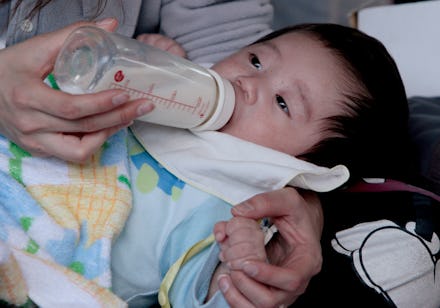Climate Change Might Be Having One Alarming Effect on Japanese Families

The news: There are many well-documented effects of climate change, from melting glaciers and rising sea levels to ocean acidification and shifts in gravity. But a new study suggests there might be another rather startling consequence of fluctuating global temperatures: a change in the human sex ratio.
The study, recently published in the journal Fertility and Sterility, tracked births and spontaneous abortions in Japan from 1968 to 2012 and calculated how the sex ratio for each year correlated with temperature patterns. The result? During months of intense weather fluctuations — especially heat waves — there was an increase in male fetus deaths as well as female births.
"The recent temperature fluctuations in Japan seem to be linked to a lower male:female sex ratio of newborn infants, partly via increased male fetal deaths. Male concepti seem to be especially vulnerable to external stress factors, including climate changes," the researchers wrote.
What's also alarming is the fact that these troubling patterns are being documented in a country that's already facing a major population decline that some experts believe could result in a 32% population decrease by 2065.
What does this mean? "Temperature-dependent sex determination" is not a phenomenon unique to humans. Plenty of species, including fish, reptiles and apes, are affected by temperature and can have a skewed sex ratio depending on environmental stimuli.
What this latest research suggests is that male human fetuses are especially vulnerable to temperature changes. This is in line with previous studies that found male fetuses are at higher risk for death or damage from and more negatively affected by stress factors experienced by expectant mothers.
But it's not the end of mankind just yet. The researchers have been careful to point out that right now, all they have is an association between temperature fluctuations and changes in the birth ratio, and it's premature to claim that climate change is the only factor influencing this trend. There may very well be other environmental causes — earthquakes, toxic agents — that also pose a threat to male fetuses. Climate change just might end up being one of these threats.